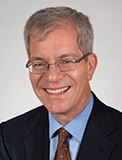Two Steps in Support of Career Development
President's Views
BY ROBERT J. SILVERMAN

As I write in early April, the AFSA award nominations have come in, and I am so pleased that we have another record number of nominations. I hope many of you will attend the awards ceremony on June 9 at the State Department to recognize our colleagues’ principled dissent and outstanding performance.
I am in the last months of a two-year tour as AFSA president, realizing that there is much more work ahead to promote and defend the Foreign Service, but pleased that there are great candidates ready to serve as AFSA president and carry on with the fine team here at AFSA.
One strategic goal of this Governing Board has been to strive to ensure that the next generation of the Foreign Service is afforded the same career opportunities that we enjoyed. Those opportunities are not assured. Here are two of the steps we took toward that goal.
First, we established criteria with the State Department for taking Foreign Service positions out of the bidding pool for a cycle and granting them as developmental assignments to Civil Service employees. Based on past practice and our reading of the rules, we asserted that the department needed AFSA approval of such actions. When the department denied this assertion, we filed a grievance citing the case of the Embassy London Iran Watcher position.
The department initially put the London position in the Overseas Development Program for civil servants, a new program created by the 2010 QDDR. When this AFSA Board came in, the department wanted to double the program from 20 to 40 Foreign Service positions, but we pushed back out of concern for the lack of adequate overseas positions at the mid-levels of the Service.
Eventually we settled the grievance on favorable terms—the London position was returned to the Foreign Service bidding pool for this cycle, and we are finalizing procedures with the department for this program going forward.
Given the current deficit of mid-level overseas positions, we should reconsider putting any positions into the program. We want to support the careers of our Civil Service colleagues, but we need to ensure that there are a sufficient number of positions for the Foreign Service in the system now and in the future.
Second, we pushed back against one aspect of the increasing politicization of the department’s senior positions. As I noted in last month’s column, “How to Find the Next Bill Burns,” we need to keep policy jobs in the career ranks as incubators for our future leaders.
One area where the Foreign Service is being severely challenged is the increasing transfer of the most important embassies (in terms of U.S. policy) to political appointees, who are usually not campaign bundlers but rather National Security Council staff members.
A partial list of such posts (with examples of career FSOs who previously served as ambassadors there and rose to the top of the Service) would include: USNATO (Toria Nuland, Nick Burns), Russia (Bill Burns, Tom Pickering), Israel (Dan Kurtzer, Tom Pickering), South Korea (Kathy Stephens, Chris Hill), South Africa (Princeton Lyman), Argentina (Tony Wayne) and India (Nancy Powell, Frank Wisner).
This is a different problem than sending bundlers to pleasant postings in Western Europe, and should be easier to reform.
How can we effectively advocate for the nomination of career FSOs rather than NSC staffers (in addition to appealing to good stewardship of the career ranks)? Many NSC policy experts possess knowledge of the languages, cultures and institutions, which are illustrative qualifications for ambassadors noted in the Foreign Service Act of 1980.
AFSA’s Guidelines for Successful Performance of Chiefs of Mission provides an answer. It fleshes out what the Foreign Service Act means when it calls for all nominees to possess “clearly demonstrated competence.” The guidelines state a nominee must have the “capacity to lead the operations of a diplomatic mission effectively.” This is an area where FSOs are better qualified than NSC experts. The latter often have little or no leadership experience in overseas settings.
So, this AFSA Board has provided a couple of new tools to our successors to continue the ongoing advocacy work.
Be well, stay safe and keep in touch,
Read More...
- AFSA Acts to Protect the Integrity of FS Assignments System (The Foreign Service Journal, Dec. 2014)
- Limited Noncareer Appointments Under Section 303 of the Foreign Service Act (U.S. Department of State Foreign Affairs Manual Volume 3)
- How to Find the Next Bill Burns—President’s Views (The Foreign Service Journal, April 2015)
- Guidelines for Successful Performance as a Chief of Mission (AFSA)
- AFSA Awards

